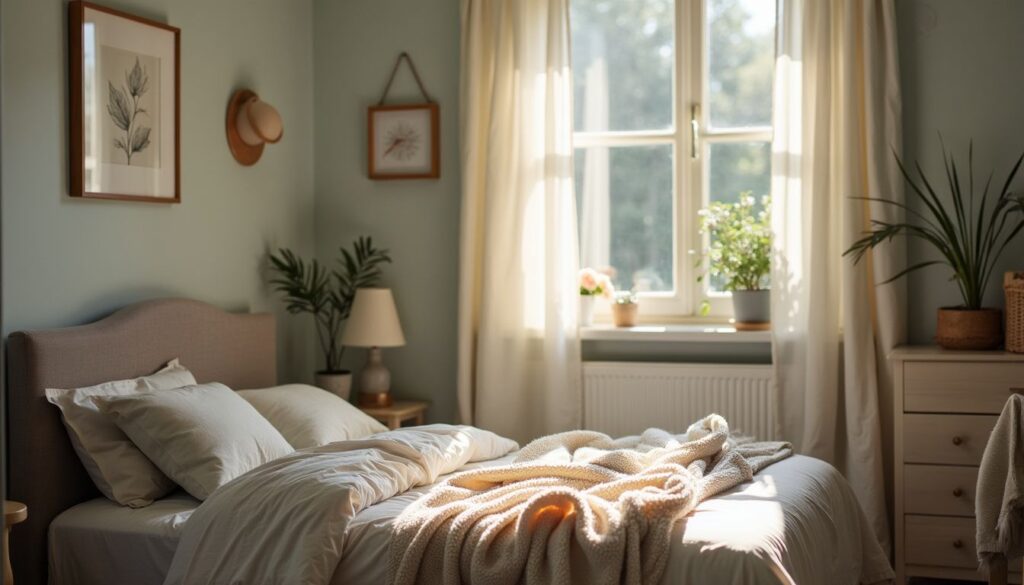Many caregivers feel stressed. About 1 in 3 adults in the U.S. are caregivers. This blog shows ways to make a bedroom a relaxing place for them. Read on for tips.
Key Takeaways
- Use light colors and simple designs in the bedroom. This helps calm your mind.
- Keep the room cool and air moving for a good sleep.
- Try sitting still and deep breathing to relax before bed.
- Sweet smells like lavender can make you feel more relaxed.
- Making these changes helps caregivers sleep better and stress less.
Optimizing Bedroom Environment for Relaxation

To make a bedroom relaxing, focus on simple designs and soft colors. Keep the room cool and air moving for comfort.
Use calming colors and minimalistic design
Choosing soft, calming colors can make a big difference in reducing stress. Colors like light blue, soft green, or pale yellow help create a peaceful space. A room with less clutter and simple design lets your mind rest after a long day of caregiving.
Having only essential furniture and decorations keeps the focus on relaxation.
To keep the air fresh, open windows when you can for proper ventilation. Make sure the temperature in your room feels comfortable to help with sleep. Next, consider adding relaxation techniques to your routine before bed.
Ensure proper ventilation and comfortable temperature
After selecting soothing hues and a minimalist design, consider the aspects of ventilation and coziness in your bedroom. Letting in fresh air through open windows aids in stress reduction.
Employing a fan could also help in maintaining the air circulation. During nighttime, ensure the room’s temperature is comfortable, neither too chilly nor too warm. The ideal temperature for an optimal sleep environment, as suggested by experts, is between 60 to 67 degrees.
Achieving quality sleep can significantly lower stress levels for both caregivers and the individuals they attend to.
Proper management of temperature, using air conditioning or heating systems, is essential. Regular replacement of filters is recommended for their efficient operation and to ensure air purity.
Extremely high or low temperatures could potentially intensify headaches, thereby increasing stress. One should be aware that physical discomforts, like headaches, are often indicative of caregiver stress commonly observed in prolonged stressful situations such as dementia caregiving or managing end-of-life matters by health professionals in collaboration with systems lending support to family caregivers.
Incorporating Relaxation Techniques
To ease the mind before sleep, try calming practices like sitting still and focusing on your breath. Adding sweet-smelling oils to your room can also make a big difference in how relaxed you feel.
Practice mindfulness or meditation before bed
Mindfulness or meditation prior to sleep can help alleviate anxiety and stress for caregivers. The Alzheimer’s Foundation of America champions these techniques to mitigate feelings of sorrow and physical complaints.
- Identify a peaceful corner in your bedroom that will remain interruption-free.
- Select a comfortable posture, either sitting or lying down.
- Shut your eyes and engage in slow, profound breaths. Inhale through your nose, hold it, then exhale through your mouth.
- Center your attention on your breathing. Observe the sensation of each breath.
- If thoughts intrude your mind, softly guide them away and recenter focus on your breath.
- Use soothing sounds such as classical music or sounds from nature to help keep your mind concentrated and serene.
- Consider using guided meditation apps made for stress relief or videos provided by credible mental health specialists.
- Incorporate this routine for 5-10 minutes each evening prior to retiring for the night.
This straightforward activity aids in managing heart rate and blood pressure, facilitating falling asleep and fostering overall mental well-being.
Utilize aromatherapy with calming scents
After practicing mindfulness or meditation, introducing aromatherapy into the bedroom can further help with relaxation. Aromatherapy uses calming scents to improve sleep, reduce irritability, and even cut down on substance misuse. Here’s how it works:
- Choose calming oils like lavender or chamomile. These fragrances aid in relaxing the mind and body, ensuring a peaceful transition to sleep.
- Set up an oil diffuser in your bedroom before bedtime. This device spreads the essence of the calming oils throughout the room, creating a serene atmosphere.
- Apply a few drops of essential oil to your pillow. This direct method helps you breathe in soothing scents as you sleep, enhancing your rest quality.
- Combine aromatherapy with deep breathing exercises. Taking slow, deliberate breaths while inhaling calming scents doubles the stress-relief effect.
- Schedule aromatherapy sessions regularly to establish a routine. Consistency is key to experiencing sustained benefits like improved mental health and stress management.
- Consider portable scent sachets for moments away from home. They offer quick relief from stressors encountered during daily activities or work.
Aromatherapy provides a simple yet effective way to create a restful environment for caregivers after exhausting days of managing care homes, assisted living responsibilities, or dealing with chronic illnesses in loved ones.
Conclusion
To reduce stress in a caregiver’s bedroom, follow these steps. First, paint the room with calm colors and keep the design simple. Make sure the room is well-ventilated and at a comfortable temperature.
Next, try mindfulness or meditation before sleep and use calming scents for relaxation. This will help caregivers rest better and manage stress effectively. These small changes can make a big difference in mental health and overall wellness for caregivers who give so much of themselves every day.
For more in-depth strategies on creating a peaceful sleep environment, visit our guide on how to optimize your bedroom for relaxation and stress reduction.
FAQs
1. How can caregivers reduce stress in their bedrooms?
Caregivers can minimize stress by practicing self-care techniques, maintaining a healthy diet and regular physical activity like swimming or workouts. It’s important to create a calming environment that promotes rest and reduces insomnia.
2. What role does social support play in reducing caregiver burnout?
Social support plays a vital role in relieving mental stress for caregivers. Connecting with fellow caregivers, friends, family or even professional health care providers such as social workers provides emotional relief and practical advice.
3. Can lifestyle changes help manage chronic stress for caregivers?
Yes! A balanced diet, regular exercise and engaging in activities of daily living that promote creativity can significantly reduce chronic stress levels while also improving physical health.
4. Are there any legal provisions to assist those providing long-term care at home?
The Federal Family and Medical Leave Act allows certain employees to take unpaid leave for medical reasons or to care for ill family members without losing their job or insurance coverage.
5.What are some options available if the caregiver needs respite from their duties?
Respite care services provided by nursing homes or day cares offer temporary relief allowing the caregiver time for self-care which is crucial in preventing fatigue caused by continuous caregiving tasks.
6.How does professional guidance help alleviate caregiver’s mental burden dealing with end-of-life issues?
Mental health professionals provide necessary empathy, compassion along with guidance on how to handle sensitive situations related to palliative medical care effectively thus minimizing distress experienced by the caregiver.









